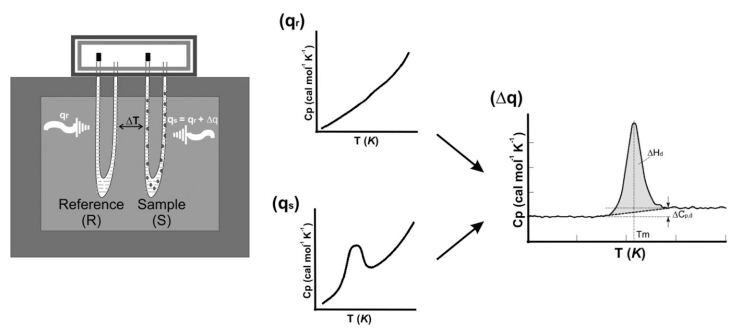Differential Scanning Calorimetry (DSC)
DSC is a thermoanalytical technique used to monitor heat effects, especially in the studies of polymers, liquid crystals, oxidative stability, safety screening, drug analysis and general chemical analysis. With DSC, we can analyze the heat capacity and physical transformation (e.g., glass transition, crystallization and melting) of a protein sample. The applications of DSC also include determining melting point, percent of crystallinity and crystallization kinetics, etc. Creative Biostructure provides highly sensitive and comprehensive MagHelix™ DSC service for the above mentioned purposes.

Figure. Experimental setup for a DSC experiment. (J Biomol Tech. 2010)
Calorimetry is a key technique connecting temperature and specific physical properties of substances to directly determine the enthalpy associated with the process of interest. There are various types of calorimeters, among which DSC is a thermal analysis instrument to measure how physical properties of a sample change. It is commonly used to study biochemical reactions. Just as shown in the figure, there are two types of DSC operating with different mechanisms: power-compensated DSC and heat-flux DSC. In a power-compensated DSC, the sample material is enclosed in a pan and there is another empty reference pan, the both pans are surrounded by separate furnaces and heated by separate heaters. During heating, the heater need give different power to keep the sample and empty reference at same temperature. Then the difference of thermal power that is needed to keep them at same temperature is measured. Compared with power-compensated DSC, in the instrument of heat-flux DSC such as IR (infrared)-heated DSC and SRDSC (self-reference DSC) technique, there is only one heater. The empty reference pan and the sample material pan are put on a thermoelectric disk which is surrounded by a furnace heated by a heater. Finally, the temperature difference between the reference and sample pans would be measured by area thermocouples owing to the heat capacity (Cp) of the sample. According to the thermal equivalent of Ohm's law, q=ΔT/R, the heat flow is determined. DSC is a powerful technique in the study of biochemical reactions. It facilitates to know about the thermoanalytical parameters of biomolecules. Now several new DSC heat flow measurement technique has been also developed.
Our MagHelix™ analytical methods for biophysical characterization of biomolecules include but are not limited to:
- Protein Thermal Shift Assay
- Surface Plasmon Resonance
- Isothermal Titration Calorimetry
- Differential Scanning Calorimetry
- Saturation-Transfer Difference
- Bio-Layer Interferometry (BLI) Technology
Ordering Process
References:
Pooria Gill, et al. Differential scanning calorimetry techniques: applications in biology and nanoscience. Journal of Biomolecular Techniques. 2010 Dec; 21 (4): 167-93.
